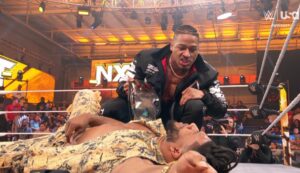Season three of Dark Side of the Ring kicked off with a two-part special episode on “The Loose Cannon,” Brian Pillman. This week, Dark Side of the Ring took a deep dive into the life and times of deathmatch wrestling specialist, Nick Gage. Independent wrestling fans, particularly in regard to Game Changer Wrestling, will be familiar with “The King of Ultraviolence.” What did viewers come away learning about Gage? Here’s what to know.
Jon Moxley recalls a match he had with Nick Gage.
During said match, Gage used a pizza cutter, not only cutting the future AEW World Champion across the forehead but the mouth as well. Nonetheless, Jon Moxley looked back on the match fondly, citing the energy of the crowd that motivated Gage and himself. Afterward, they shared a cigarette and a beer.
The Tournament of Death VIII
Taking place in Delaware, the Tournament of Death pits wrestlers against one another in ultraviolent matches. In the finals of the tournament, Nick Gage faced Thumbtack Jack, which was described as a “real-life horror show,” complete with light tubes surrounding the ring. At this time, Gage’s popularity was at an all-time high. However, when Gage went through the light tubes, one cut him too deep, to the point where blood literally poured out of him. The gash had severed an artery in his arm.
Gage was forced to walk off before being tended to by medical staff. All the while, Gage desired to finish the match, despite the shape he was in. As Gage was being airlifted to the hospital, he temporarily flatlined, being declared legally dead during that period.
Nick Gage recalls wanting to wrestle at a young age.
He grew up in National Park, New Jersey, raised by a single mother, who he expressed fondness for. He also has a brother, Chris, who would become a wrestler as Justice Pain. Gage’s father was a wrestling fan; he remembers watching Saturday Night’s Main Event as a child. In his youth, he would partake in backyard wrestling, utilizing such objects as barbed wire, inspired by Japanese wrestling and Extreme Championship Wrestling. The latter would give rise to Combat Zone Wrestling.
To deal with the pain, Gage relied on drug use.
Understandably, deathmatch wrestling took a physical toll on Nick Gage. This would lead to his drug use. Oxycontin was one of the drugs that Gage specifically mentioned. It was also said, by Game Changer Wrestling founder Brett Lauderdale, that Gage partook in heroin. As this continued, his relationship with his brother deteriorated. During a heated match that ended abruptly, Gage suffered a shoulder injury. His life worsened when his mother passed away from breast cancer.
Brett Lauderdale returned home one night to see that Nick Gage and his girlfriend broke in to stay.
Angry, Lauderdale kicked them both out. Without anywhere else to go, Gage turned to crime, robbing a bank. After stealing money, Gage returned to Lauderdale, making the excuse that he robbed a drug dealer. Moxley recalled seeing surveillance footage from the bank, with Gage’s face clearly displayed. Now with a criminal record, Gage’s goal was to spend the money he stole in Atlantic City, New Jersey. If Gage believed he was going to prison, he decided to spend his time in luxury.
Once Gage was ready, he called Lauderdale, ready to turn himself in.
Gage was set to serve five years in prison. Chris never visited his brother. During his time in prison, Gage received a high volume of fan mail. Gage’s goal, upon leaving prison, was to show the world that he was a changed man and put deathmatch wrestling back on the map. He would soon be released on parole, returning to CZW. Meanwhile, Lauderdale would establish the Nick Gage Invitational. Prior to this, however, Lauderdale received a call, saying that Gage was re-incarcerated.
Nick Gage attempted to falsify urine for a drug test, though there may have been more to this.
Once the authorities caught Gage, he was set back to prison for another two years. Meanwhile, GCW grew in popularity and Lauderdale planned for Gage’s return. Once again, fans welcomed him back with open arms. He would soon regard his fans as the Murder Death Kill, or MDK, Gang.
One of Nick Gage’s most notable matches was against David Arquette.
David Arquette, determined to earn the respect of fans, prepared for his return to the ring. Arquette was open to the idea of a deathmatch. He met with Gage for a meal, where Gage informed Arquette of the gruesome reality of the match type. The two would meet at Joey Janela’s LA Confidential in November of 2018. A collection of weapons, including light tubes and a pizza cutter, were utilized. Gage would also stab Arquette in the neck with a broken light tube. The match saw Gage win following a judo throw. Gage vs. Arquette went viral, resulting in a burst of popularity for the former. Meanwhile, Arquette expressed no interest in revisiting the deathmatch genre.
In January of 2020, Gage’s brother passed away due to suicide.
According to Lauderdale, Justice Pain stole a car. While being pursued by police, he jumped off the Walt Whitman Bridge. The bridge is located behind Gage’s house.
Nick Gage continues to wrestle to this day.
Moxley cited Gage’s ability to connect with the audience, saying that Vince McMahon would love a star with his ability to connect. Gage says that he feels he represents those that have been in trouble in life but work to bounce back.
Stay tuned to the Last Word on Pro Wrestling for more on this and other stories from around the world of wrestling, as they develop. You can always count on LWOPW to be on top of the major news in the wrestling world, as well as to provide you with analysis, previews, videos, interviews, and editorials on the wrestling world. Catch Dark Side of the Ring on VICE, with new episodes airing each Thursday at 9 PM EST.
Looking to talk wrestling, pro football, or any number of sports? Head on over to the LWOS Boards to engage in conversation with fellow fans!






